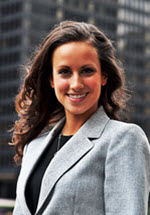From Engineering to Part-Time MBA Student


Q & A with Jackie DiMonte, University of Chicago, Booth School of Business.
What was your undergraduate engineering major specialty (electrical, mechanical, etc.)?
I specialized in general engineering with a control systems concentration.
Tell us about yourself (who you are, where you are from, how you got to where you are today)?
I did my undergrad at the University of Illinois at Urbana-Champaign. I really enjoyed the challenge of engineering, but some of the entry-level engineering roles in control systems weren’t interesting and I wasn’t yet ready to commit to pursing a PhD. So, I started consulting at Accenture. A few years in, I began attending Booth as a part-time student and eventually transitioned to working at Silver Spring Networks. Silver Spring Networks does IoT for “critical infrastructure". I focus on smart cities and love it –I get to use my engineering background along with what I am learning in pursuit of an MBA
What's your dream career?
Taking on a strategic role in growing technologies companies. I don’t think I’ll ever take on a role that doesn’t have some link to innovation and technology.
Why business school?
I always knew I wanted to go back to school after undergrad, I just didn’t know quite what I wanted to study. After a few years in consulting, I realized my consulting experience would best supplemented with the theory taught and the skill developed at business schools
What was your career before business school?
Consulting.
Did you know in undergrad that you wanted to go to graduate business school?
Not at all! I always knew I enjoyed school and wanted to get a masters. It wasn’t until a few years in the workforce that I realized I was missing some key skills that are learned while pursuing an MBA.
Where would we find you when you're not in class?
At work! As a part-time student, I balance my time between work and school. I like to work out each morning to blow off some steam
How did your engineering experience help you stand out as a business school applicant?
There’s a lot of credibility that comes with an engineering background. I don’t think anyone can doubt your aptitude for quant!
Which skill sets from your engineering background do you think are your strongest assets in business school?
You develop a great methodology for problem solving as an engineer. I think being able to break down and tackle a problem is something that comes naturally to anyone who has been put through a few years of engineering undergrad.
How did you fit studying for the GMAT™ exam into your busy schedule?
While studying for the GMAT, I was also working full time and attempting to finish my b-school applications. There was a lot going on so I had to use whatever free time I had efficiently. I had 45 minutes or so most weekday mornings when I used to read the paper that I turned into study time as well as larger blocks of time on the weekends. To use this time efficiently, I tried to identify the type of studying I could do in shorter periods of time (various quant questions or some verbal questions like sentence correction) versus the types that required long periods of focus (reading comprehension, any integrated reasoning) and match that to the time I had free during the week.
What's your best GMAT study tip?
Block out a couple hours each week when you can turn off your phone, disconnect from email, and concentrate completely on studying. Building up endurance for taking the exam is key.
What's your remedy for pre-test nerves?
Athletes train hard during the weeks approaching a big game, but a few days before, they begin to taper their training. I did the same while preparing for the GMAT. I knew if I tried to study like crazy or cram before the exam, I would stress myself out. I also knew that if I tried to do anything besides study, I’d start thinking about studying and become anxious. So, I made a list of things (limited number of notecards to review, a few problems to re-do) that I could do before the exam to keep my mind occupied. I kept the list limited to things I knew I could accomplish in a short period of time so that I did not feel overwhelmed. When I finished, I had a sense of accomplishment and felt confident that I could take on the exam.
How well-prepared for business school do you feel, after studying for the GMAT exam?
Studying for the GMAT prepared me for b-school in more ways than one. Most significantly, I learned how to use small bits of “down time” productively. Otherwise, I found quantitative skills review to be helpful (and necessary) for getting back into classes like econ. I was also able to use some of the sentence correction rules to improve my own writing and grammar use in work and school.
What advice do you have for other engineers who are planning go to business school?
Think about what do you want out of school. How is it going to enable your goals? Are there alternative options to get the same training or similar experiences? This exercise will help you come to a decision if b-school is the right investment for you. Also, you’ll have a better idea of what types of programs you want to target as well as a clear understanding of your motivations – it will help you when it comes time to writing those admissions essays!
What was your biggest challenge you had to overcome?
Even to this day time management is the biggest challenge. Working full-time and attending school part-time means endless tradeoffs.
Biggest reward you reaped?
The biggest reward that I reaped was increased self-confidence.
What resources did you use to research graduate business schools and programs to which you applied or may apply?
I did a lot of online research but I think the most helpful and impactful method was actually visiting the schools. After attending a few schools’ information sessions and classes, applying to Booth was an easy choice.
Does your school have activities, courses or clubs for students interested in engineering and an MBA?
Yep! I co-founded our part-time MBA technology group that serves as a great resource for folks interested in tech. Our Career Resources and Programming groups do a great job of catering to our diverse student body.



